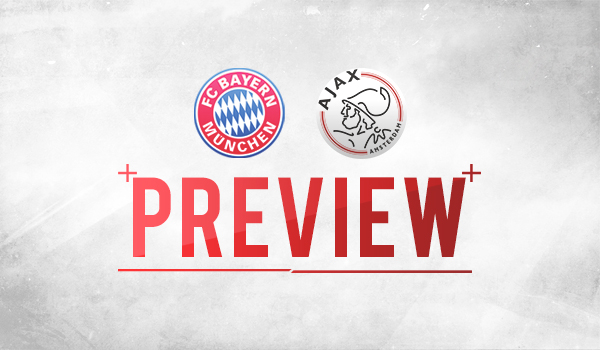Preview: FC Bayern between Hertha and Ajax
When Uli Hoeneß spoke of how it was important to him that a coach knows the club, a lot of observers rolled their eyes. Again, this claptrap about pedigree. But now at the latest it becomes clear that he has a point. The way Kovač is coping with the first hiccup that has come his side’s way is nothing if not masterful. Impressive, above all. He has calmly brushed away the dramatisation of recent results.

In case you missed it
The week was truly not a good one for the coach. Against Augsburg he wanted to really fire up the rotation machine. Not a surprise, then, that the team hardly got going in the early stages. Yet after 20 minutes, the guests’ high pressing was out-manoeuvred with increasing regularity.
Though Bayern didn’t play really well, they seemed to have everything under control. A second or third goal could well have followed the 1-0. But it didn’t. What followed was the late equaliser from a strong Augsburg team that made the absolute most out of the chances they got. It was the first little blow to the head for Kovač, who got a lot right with his rotation and yet ultimately got everything wrong. Because the result wasn’t right.
On Friday evening, FC Bayern wanted to put things back to normal. A very strong Hertha, who didn’t just play with a lot of application but also good intelligence above all, made life difficult for the team though. A present from the penalty spot handed over by Bayern as well as a really well-worked goal put the final nail in the coffin for what has been the unhappiest week under Kovač to date.
Bayern lost leadership of the league to Borussia Dortmund and now go into the second matchday of the Champions League on the back of a defeat. Suddenly the advanced central midfielders aren’t such a proven tactical strategy anymore, nor proof for Kovač being able to make clever decisions tactically. To many they are seen as a bad decision that gave Hertha too much room to counter.
Suddenly the hype around the calm Kovač has died down a little. The first calls are starting to sound that the championship could actually be a lot more exciting than many thought. Bayern showed where they can be targeted. The first signs of a constructed crisis that are doing the rounds in Munich. Now it’s going to get really interesting. Because Kovač can prove, especially now, that he’s made for this club.
4 things we noticed
1. The calm within the hiccup
Sober, calm, objective – qualities that Bayern fans learned to appreciate about their new coach early in the season. Now, too, where things aren’t quite going to plan for the first time, Kovač exudes an unbelievable calm that spreads to the entirety of the club.
But he’s also showing hunger and drive in this calm. “We won’t put up with this,” he said in an inimitable way at the press conference in Berlin. He was already looking forwards in those moments.
There’s no reason whatsoever for panic. Kovač knows that too. He could have come out swinging and reminded his players of their obligations. But he left it at the objective analysis that the general evaluation would have been different with a better conversion of chances. Then the word “crisis” had to stay in the cupboard.
“We weren’t quite as present in the first half as we were in the second. Small details were missing, and that makes the difference,” concluded Kovač. And he’s right in that. A 0-2 loss in Berlin sounds terrible. But FC Bayern’s performance wasn’t a catastrophe. Kovač knows very well that nuances were lacking. That there will be games like that more often. And that Hertha BSC didn’t just have an excellent day, but also the requisite luck.
All the more important, then, is a coach who can keep his calm. Otherwise the little hiccup threatens to become a choke.
2. A question of quality
And yet it’s not automatically all bad for Bayern. Individual mistakes were noted by Kovač and equally Joshua Kimmich, who questioned the team about their quality in this point.
It demonstrates a lot of self-reflexion that coach and team can evaluate and compartmentalise these mistakes so precisely. It will only be possible to achieve progress with honest self-critique. It is in fact a question of quality when the conversion of chances isn’t right precisely when it’s needed most.
Robben could have scored the equaliser with his huge chance. Before that, too, there were a lot of good chances that were mostly not played out right. Instead, Hertha went 2-0 up shortly after Robben’s chance with their third chance. “Conversion of chances is a big topic. We need to put those away, that was missing again,” said Kovač.
It sounds brutal when the quality of such a team is questioned after two bad results. But it’s about how that question is asked. Kimmich asked it in the right context. That is, looking ahead and with the awareness that the quality wasn’t generally lacking, just in certain moments. And that can be worked on.
3. Think outside the box-to-box
Against Stuttgart and Leverkusen we cheered the coach’s idea that the central midfielders could push much higher up against deep-lying teams. Thiago, Hummels, and Boateng have the quality to play the ball far forwards. However, we also held that it causes gaps to open up in the half-space that could be exploited on turnovers.
Hertha exploited these gaps on Friday evening. Bayern lacked protection and safety in their passing game. Stray passes were only facilitated by the advanced box-to-box midfielders and so a game developed that was too quickly diverted out wide.
Kovač has enough chances to continue to implement his idea. Tolisso worked really well in that set-up as a link player. The Frenchman dropped back constantly against Leverkusen and so supported Thiago. James can take on that role in principle too, having, most likely under advice, stayed rather higher up.
Another alternative are the full-backs moving inside. They can shorten the distances to the box-to-box midfielders in the build-up and simultaneously provide protection from counters. That would also work with playing the ball into the central midfielders, who then lay the ball off to the full-backs who have cut inside.
In any case, more ways have to be found to find the spaces between the lines with a healthy balance of risk and safety. Otherwise the advanced box-to-box midfielders could box Bayern into a situation where dangerous gaps are left exposed.
4. Building on the positives
Now this last week wasn’t one you’d want to think back to later when reviewing the season. But why not? Maybe it was the right sign at the right time. Maybe Bayern will take this defeat and make the right conclusions from it.
In addition, it was by no means all bad. In Berlin, Bayern managed to get beyond an excellent defence several times. Ribéry and Alaba were very flexible in their positioning and constantly got behind Hertha’s back-line with different combinations. They were often supported in that by James or Lewandowski.
These quick break-throughs were more than worth seeing and although Hertha were also right onto the man, Bayern managed to create good shooting chances in the box.
On the other side, things looked similar when Robben combined with Kimmich and then later Müller. There was a lot of positional switching and ultimately several break-throughs. Precisely because Robben and Ribéry can’t do it on their own so often anymore, they need that support. The aim used to be to isolate them. Now it’s about integrating them as successfully as possibly. Then they’ll continue to bring surplus value. If, however, they’re reliant on dribbling, then bad turnovers loom. That’s becoming clear with Ribéry most of all.

(Photo: Boris Streubel / Bongarts / Getty Images)
That few chances came from the good combinations wasn’t, however, down to the wide players. In the centre there was a lack of movement and dynamism. Bayern missed Goretzka or Tolisso that evening. Both can arrive in the box from deep cleverly and thus create space for Lewandowski or themselves. As it was, though, it was mostly simple enough for Berlin to defend the crosses.
There are, however, plenty of good things for Kovač to take from the games against Augsburg and Hertha, things for him to now build upon. Ajax are a team that want to play football. With their sometimes wild but aggressive pressing, they will probably cause Bayern similar problems as Hertha did.
But this time it’s a home game. Kovač and his side are itching to directly banish that absurd word “crisis” once more. Attitude, will, and ambition are there. Now the tweaking in possession needs to follow. Then FC Bayern should be back on track. A drama certainly looks quite different.





